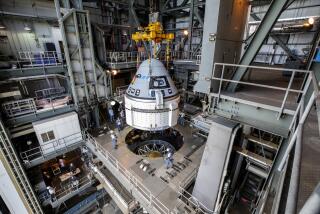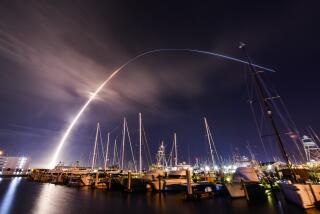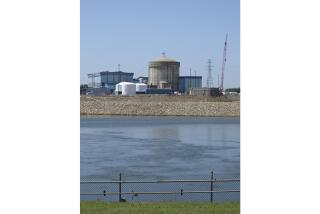NASA Reportedly Was Told of Peril in Rocket Boosters
- Share via
NEW YORK — The National Aeronautics and Space Administration was warned last year that a shuttle catastrophe could occur because of possible trouble with critical seals in the space shuttle’s solid-fuel rocket boosters, the New York Times reported in today’s editions.
Space agency documents reportedly showed that engineers at NASA headquarters and at the Marshall Space Flight Center in Huntsville, Ala., were concerned that leaks could develop where seals join booster fuel segments, the newspaper said.
A NASA spokesman in Washington refused to comment on the account.
The shuttle Challenger’s external fuel tank exploded Jan. 28, killing seven crew members, apparently after flame shot through the wall of the shuttle’s right-side rocket booster, possibly in the area of a seal, which either heated the tank to the rupture point or burned through its thin skin.
The newspaper said an internal memorandum issued last July by a NASA analyst warned that flight safety was “being compromised by potential failure of the seals.” The analyst reportedly said: “Failure during launch would certainly be catastrophic.”
A NASA “critical items list” issued in 1982 for the booster also warned that the result of the failure of the seals could cause “loss of vehicle, mission and crew due to metal erosion, burn-through and probable case burst resulting in fire” and a quick, intense burning of the spacecraft, the newspaper reported.
NASA Reaction Unclear
The issue was listed as an item of concern in agency documents as recently as December, 1985, but it was not known what action, if any, was taken by NASA officials in response to the memorandums sent by its engineers, the newspaper said.
Space agency authorities declined to answer questions about the issues raised by the engineers in the internal memos, the newspaper said.
NASA spokesman David Garrett said he gave the New York Times report to David Winterhalter, acting director of the agency’s shuttle propulsion division, and L. Michael Weeks, deputy associate administrator of the office of space flight.
According to the newspaper, Garrett said they declined comment.
Moore Unavailable
The newspaper said Jesse W. Moore, associate administrator for spaceflight and chairman of NASA’s internal accident review board, did not return a telephone call to his home, even though a family member said he was there.
A solid-fuel rocket analyst who has worked closely with propulsion engineers from the Kennedy Space Center in Florida, which puts the rocket boosters together, the Marshall center in Alabama, which is responsible for the booster design, and NASA headquarters in Washington, gave the internal documents detailing the problems with the seals to the New York Times, the paper said.
More to Read
Sign up for Essential California
The most important California stories and recommendations in your inbox every morning.
You may occasionally receive promotional content from the Los Angeles Times.










